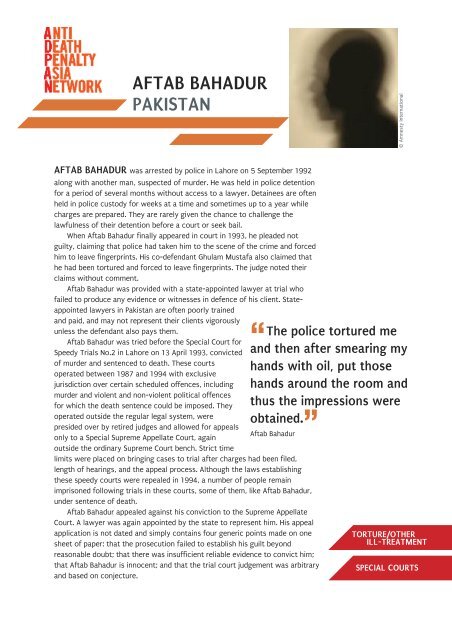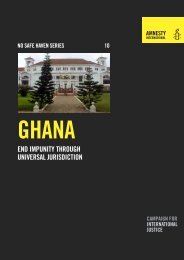Injustice - Amnesty International Schweiz
Injustice - Amnesty International Schweiz
Injustice - Amnesty International Schweiz
Create successful ePaper yourself
Turn your PDF publications into a flip-book with our unique Google optimized e-Paper software.
AFTAB BAHADUR<br />
PAKISTAN<br />
© <strong>Amnesty</strong> <strong>International</strong><br />
AFTAB BAHADUR was arrested by police in Lahore on 5 September 1992<br />
along with another man, suspected of murder. He was held in police detention<br />
for a period of several months without access to a lawyer. Detainees are often<br />
held in police custody for weeks at a time and sometimes up to a year while<br />
charges are prepared. They are rarely given the chance to challenge the<br />
lawfulness of their detention before a court or seek bail.<br />
When Aftab Bahadur finally appeared in court in 1993, he pleaded not<br />
guilty, claiming that police had taken him to the scene of the crime and forced<br />
him to leave fingerprints. His co‐defendant Ghulam Mustafa also claimed that<br />
he had been tortured and forced to leave fingerprints. The judge noted their<br />
claims without comment.<br />
Aftab Bahadur was provided with a state‐appointed lawyer at trial who<br />
failed to produce any evidence or witnesses in defence of his client. Stateappointed<br />
lawyers in Pakistan are often poorly trained<br />
and paid, and may not represent their clients vigorously<br />
unless the defendant also pays them.<br />
Aftab Bahadur was tried before the Special Court for<br />
Speedy Trials No.2 in Lahore on 13 April 1993, convicted<br />
of murder and sentenced to death. These courts<br />
operated between 1987 and 1994 with exclusive<br />
jurisdiction over certain scheduled offences, including<br />
murder and violent and non‐violent political offences<br />
for which the death sentence could be imposed. They<br />
operated outside the regular legal system, were<br />
presided over by retired judges and allowed for appeals<br />
only to a Special Supreme Appellate Court, again<br />
outside the ordinary Supreme Court bench. Strict time<br />
limits were placed on bringing cases to trial after charges had been filed,<br />
length of hearings, and the appeal process. Although the laws establishing<br />
these speedy courts were repealed in 1994, a number of people remain<br />
imprisoned following trials in these courts, some of them, like Aftab Bahadur,<br />
under sentence of death.<br />
Aftab Bahadur appealed against his conviction to the Supreme Appellate<br />
Court. A lawyer was again appointed by the state to represent him. His appeal<br />
application is not dated and simply contains four generic points made on one<br />
sheet of paper: that the prosecution failed to establish his guilt beyond<br />
reasonable doubt; that there was insufficient reliable evidence to convict him;<br />
that Aftab Bahadur is innocent; and that the trial court judgement was arbitrary<br />
and based on conjecture.<br />
“<br />
The police tortured me<br />
and then after smearing my<br />
hands with oil, put those<br />
hands around the room and<br />
thus the impressions were<br />
obtained. ”<br />
Aftab Bahadur<br />
TORTURE/OTHER<br />
ILL‐TREATMENT<br />
SPECIAL COURTS
















